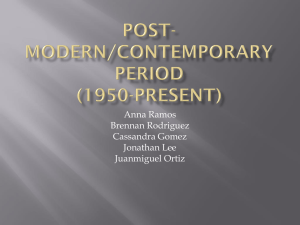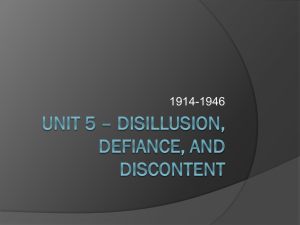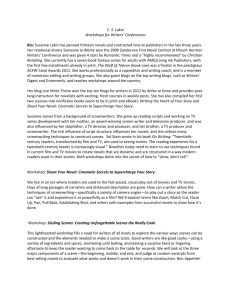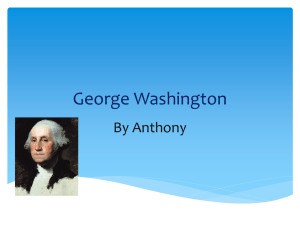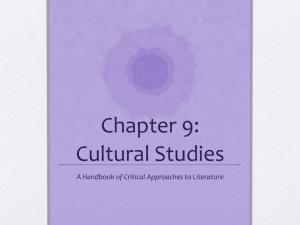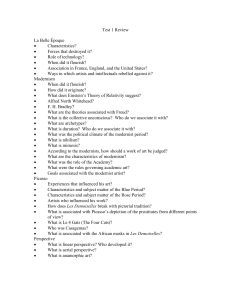Chapter 6 British Literature 79
advertisement
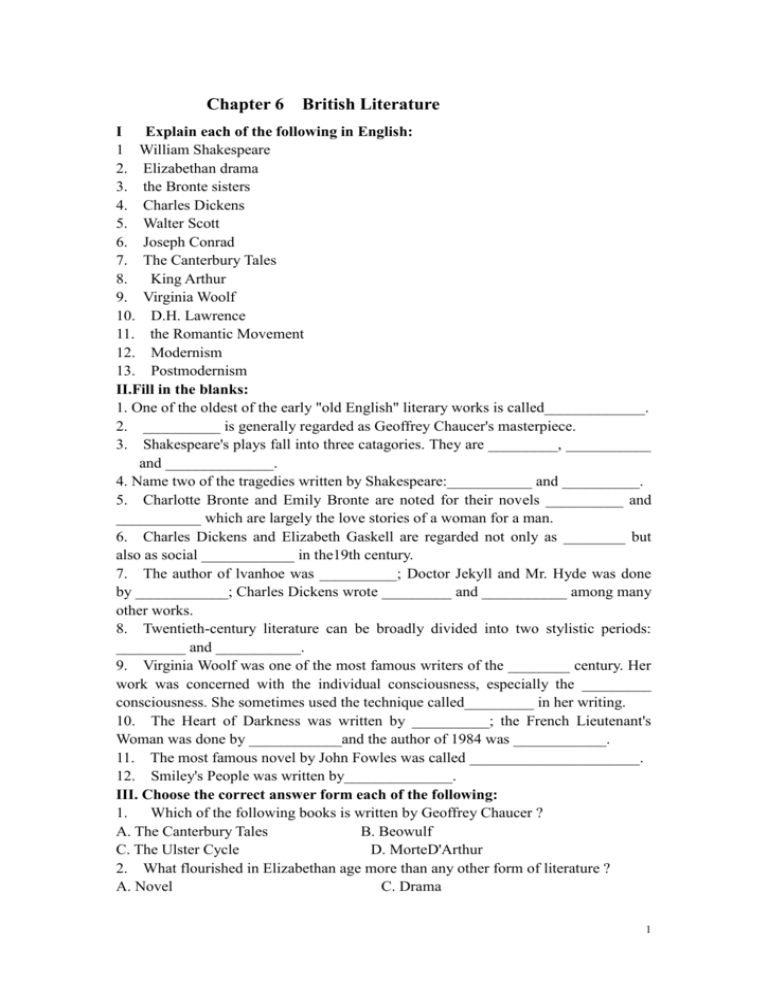
Chapter 6 British Literature I Explain each of the following in English: 1 William Shakespeare 2. Elizabethan drama 3. the Bronte sisters 4. Charles Dickens 5. Walter Scott 6. Joseph Conrad 7. The Canterbury Tales 8. King Arthur 9. Virginia Woolf 10. D.H. Lawrence 11. the Romantic Movement 12. Modernism 13. Postmodernism II.Fill in the blanks: 1. One of the oldest of the early "old English" literary works is called_____________. 2. __________ is generally regarded as Geoffrey Chaucer's masterpiece. 3. Shakespeare's plays fall into three catagories. They are _________, ___________ and ______________. 4. Name two of the tragedies written by Shakespeare:___________ and __________. 5. Charlotte Bronte and Emily Bronte are noted for their novels __________ and ___________ which are largely the love stories of a woman for a man. 6. Charles Dickens and Elizabeth Gaskell are regarded not only as ________ but also as social ____________ in the19th century. 7. The author of lvanhoe was __________; Doctor Jekyll and Mr. Hyde was done by ____________; Charles Dickens wrote _________ and ___________ among many other works. 8. Twentieth-century literature can be broadly divided into two stylistic periods: _________ and ___________. 9. Virginia Woolf was one of the most famous writers of the ________ century. Her work was concerned with the individual consciousness, especially the _________ consciousness. She sometimes used the technique called_________ in her writing. 10. The Heart of Darkness was written by __________; the French Lieutenant's Woman was done by ____________and the author of 1984 was ____________. 11. The most famous novel by John Fowles was called ______________________. 12. Smiley's People was written by______________. III. Choose the correct answer form each of the following: 1. Which of the following books is written by Geoffrey Chaucer ? A. The Canterbury Tales B. Beowulf C. The Ulster Cycle D. MorteD'Arthur 2. What flourished in Elizabethan age more than any other form of literature ? A. Novel C. Drama 1 B. Essay D. Poetry 3. Among the following writers, who was NOT one of the great trio? A. Ben Johnson C. Geoffrey Chaucer B. William Shakespeare D. Christopher Marlowe 4. Which of the following did NOT belong to Romanticism ? Chapter 6 British Literature 81 A. Keats C. Wordsworth B. Shelley D. E.M.Foster 5. Which of the following is a tragedy written by Shakespeare ? A. Dr. Faustus C. Frankenstein B. Hamlet D. Sense and Sensibility 6. Which of the following was the most famous Scottish novelist ? A. D.H. Lawrence C. Robert L. Stevenson B. Charles Dickens D. Walter Scott 7. Several gifted women played a part in 19th-century literature. Which of the following is an exception ? A. Virginia Woolf C. Jane Austen B. Emily Bronte D. Charlotte Bronte 8. Which of the following writers was NOT associated with Modernism ? A. D.H. Lawrence C. Charles Dickens B. E.M.Forster D. Virginia Woolf 9. Which of the following is generally considered to be the masterpiece by Joseph Conrad ? A. Sybil C. Bleak House B. The Heart of Darkness D. Wathering Heights 10. Which of the following was a Postmodemist writer ? A. George Orwell C. Jane Austen B. Robert L. Stevenson D. Virginia Woolf Key: Chapter 6 I Explanations: 1. William Shakespeare He was an English dramatist and poet in the Elizabethan age. He is generally regarded as the greatest playwright in English literature. His plays fall into three catagories: tragedies such as Hamlet, comedies such as Merchant of Venice and historical plays like Charles II. 2. Elizabethan drama It refers roughly to the drama produced during the 15th and 16th centuries which is known as the Renaissance. The first professional theatre was founded in London in 1576 and many famous playwrights appeared. ChristopherMarlowe, Ben Jonson and William Shakespeare were among the best. 3. the Bronte sisters They were daughters of the vicar of a village church in Yorkshire. Though they were poor, they were educated and respectable. They all died young, but were remembered 2 long after their death for their contribution to English literature. Charlotte was well-known for Jane Eyre and Emily was noted for her Wuthering Heights. They had to use male pseudonyms in order to get their books published. 4. Charles Dickens He is now regarded as one of the greatest English writers. His works were characterized by vivid comic characterization and social criticism. He wrote many well-known novels, including Oliver Twist, A Tale of Two Cities, David Copperfield, just to name the best known. 5. Walter Scott He was the most famous Scottish novelist and wrote many novels in the early decades of the nineteenth century.Some of the novels were concerned with Scottish history. Some remain popular today and several have been made into films. 6. Joseph Conrad He is one of the most famous English Modernist writers. Polish-born, Conrad was brought up in Poland and was in his twenties before he knew any English. After becoming a British subject, he wrote brilliant novels in his adopted tongue. His most well-known novel is The Heart of Darkness. 7. The Canterbury Tales The Canterbury Tales is the most important work in Middle English Literature. It's made up of a series of stories told by 31 pilgrims to entertain each other on their way to the Christian Church at Canterbury in south-east England.It's quite noticeable for its diversity, not only in the range of social status among the pilgrims, but also in style of the stories they tell. 8. King Arthur He was the King of England in the 5th Century and was the central figure of many legends. History of the Kings of Britain published in 1138 well established King Arthur in literary form. The book in-vented material to fill the broad gaps in the historical record. The stories of King Arthur's court, his knights and their famous round table and the search for the Holy Grail were mainly based on a very few vague "facts". The ruined castle at Tintagel in Cornwall mentioned in the legends of King Arthur is now a popular tourist destination. 9. Virginia Woolf Virginia Woolf is regarded as a modernist writer and one of the most famous writers of the century. Her works are concerned with the individual consciousness, especially female consciousness. Her novels have become important to feminists for the way they show women's personalities to be limited by society. In her writing, she uses the technique called the stream of consciousness. One of her best novels is Mrs. Dalloway. 10. D.H.Lawrence D.H. Lawrence was one of the most famous modernist writers in English literature. His novels were critical of the modern world, especially of the modern industrial society. In his writing, he gave up the conventions and forms that had been typical of the 18th century. One of the features of his writing was that his language was easy and 3 sentences were short. 11. The Romantic Movement . The Romantic Movement started at the end of the 18th century and the beginning of the 19th century. The spirit of Romantism places emphisis on nature, originality, the emotional and personal. The great poets of this movement are Keats, Shelley and Wordsworth. Jane Austen and the Bronte sisters are among the famous Romantic novelists.Their writings are characterized by rich imaginations and strong feelings. 12. Modernism Modernism in literature began before the Second World War (1939?945). Modernism in literature can be seen as a reaction against the 19th century form, which can be considered as assuming understanding between writer and reader. This approach to writing is called "realism". However, modernist writers express the difficulty they see in understanding and communicating how the world works. Modernist writing seems disorganized and hard to understand. One of the most famous English Modernist writers is Virginia Woolf. 13. Postmodernism Postmodernism generally refers to literature after the Second World War. It's characterized by a high degree of experimentation, George Orwell's 1984 begins "Postmodernism" in English literature. The horrors of the Second World War weakened ideas of human progress, and of meaning in life. One of the characteristics of Postmodernism is to give up the search for meaning in life. In the Postmodemist novel the French Lieutenant's Woman, the reader is offered a choice of endings. III.Fill ill the blanks: 1. Beowulf 2. The Canterbury Tales 3. tragedies; comedies; historical plays 4. Hamlet; Romeo and Juliet 5. Jane Eyre; Wuthering Heights 6. novelists; critics 7. Walter Scott; Robert Louis Stevenson; Oliver Twist; Bleak House 8. Modernism; Postmodernism 9. 20th: female: the stream of consciousmess 10. Joseph Conrad; John Fowles; George Orwell 11. The French lieutenant's Woman 12. John Le Carre III. Tick the correct answer in each of the following: I .A 2.C 3.C 4.D 5.B 6.D 7.A 8.C 9.B lO.A 4
